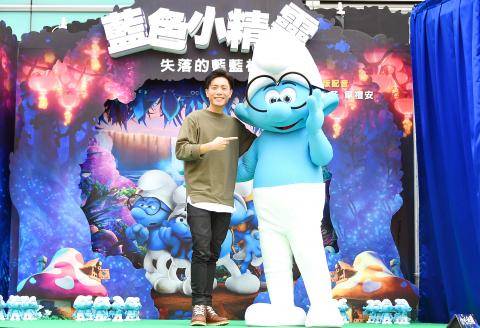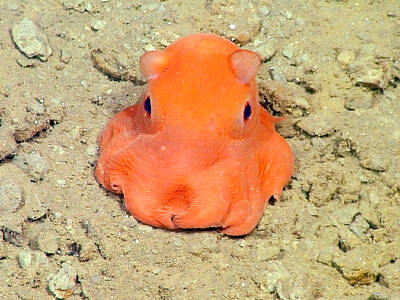The latest animated film, Smurfs: The Lost Village, has caused a wave of blue fever around the world. Singer William Wei was invited to play the voice of Brainy Smurf in the Chinese version. Dubbing for a movie for the first time, Wei says he has been a Smurf fan since childhood, and had a real sense of actually existing in the movie during the process.
The Smurfs were created by Belgian cartoonist Peyo in 1958. The village he invented is the home of blue-skinned elves, including Papa Smurf, Greedy Smurf, Lazy Smurf and Smurfette. Other main characters include the wizard Gargamel and his cat Azrael. These characters are the stuff of childhood memories for many a Taiwanese.
For Taiwan, the film company has built a unique Smurf village featuring a giant Smurf statue that costs NT$1 million, together with over 500 cute Smurf dolls. The display can be seen at the Fuxing branch of Taipei’s Sogo Department Store until April 16.

Photo: Hu Shuan-hsiang, Liberty Times
照片︰自由時報記者胡舜翔
(CNA, translated by Eddy Chang)
最新動畫電影「藍色小精靈:失落的藍藍村」在全球掀起藍色狂熱,該片中文版邀請歌手韋禮安為小聰明的角色配音。獻出配音處女秀的韋禮安表示,從小就是「藍色小精靈」的粉絲,這次擔任配音的過程,讓他覺得就像活在電影中。
「藍色小精靈」最初是比利時漫畫家培優在一九五八年所創作的,在他虛構的小精靈村莊,住著精靈老爹、小貪吃、小懶惰、小美人等。其他主角還有巫師賈不妙和他的大笨貓,他們是許多台灣觀眾童年的回憶。
這次片商也打造全台唯一的「藍藍村」,展出造價百萬的巨型「藍色小精靈」雕像,更有超過五百隻的超萌小精靈,「藍藍村」即日起至四月十六日在台北Sogo復興館展出。(中央社)

Bilingual Story is a fictionalized account. 雙語故事部分內容純屬虛構。 I stand by the Miluo River as dusk falls. The court betrayal is too much. I served Chu with loyalty. I forged alliances and fought corruption. But the whispers of jealous courtiers, the murmurs of treason, spoke louder. The king cast me out. The water looks calm. It promises peace. I step in. The river is cold against my legs. I hear shouts behind me — fishermen calling my name. I keep walking. The calls grow louder, but I do not turn around. The water rises to my chest. It pulls at me. I

In Taiwan, people can use a platform to rent a power washer for a weekend or share unused garage space for someone’s storage needs. These are examples of the sharing economy, a consumption model that has gained widespread adoption worldwide. This approach allows people to rent or share assets like cars, homes or even services, typically through online platforms. This innovative model poses a simple yet powerful question: why purchase infrequently used items when sharing is more practical? By making useful but idle resources accessible, the sharing economy turns them into sustainable opportunities. Internationally, platforms like Airbnb and Uber have popularized

Continued from yesterday(延續自昨日) https://www.taipeitimes.com/News/lang Many people may be familiar with flapjack octopuses thanks to Pearl, a charming character from the Pixar film Finding Nemo. However, her portrayal presents several scientific inaccuracies. In reality, flapjack octopuses are deep-sea creatures, which are unsuitable for the brightly lit shallow reef environment depicted in the film. Their primary defense mechanism relies on their reddish coloration, which would be ineffective in the well-lit shallows. Pearl’s famous line, “You guys made me ink,” is another fictional detail that is not consistent with the observed actions of real flapjack octopuses. As common as it is in many other octopus

A: Recently, I’ve been seeing mosquitoes flying around in front of my eyes. The doctor said it’s the “flying-mosquito disease.” B: Flying mosquitoes? What a strange name. A: They’re actually called “floaters” in English, meaning floating debris. When fibrous substances in the vitreous body inside the eyeballs increase, floaters can appear in the visual field. B: Oh my goodness. Can you get rid of them? A: According to ophthalmologist Horng Chi-ting’s research, taking the enzymes of certain fruits is likely to help reduce floaters. A: 我最近一直覺得眼前有蚊子飛來飛去,結果醫生說是「飛蚊症」。 B: 飛蚊症?好奇怪的病名。 A: 英文名稱叫「floaters」, 也就是漂浮物的意思。 因為眼球的玻璃體中纖維化物質增多,導致視野出現漂浮物。 B: 天啊!要怎麼把蚊子趕走? A: